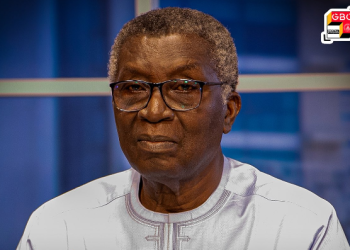The people of Akyem Ati Amanfrom in the Eastern Region, on Saturday, gave a royal and dignified farewell to their illustrious son, Nana Kwasi Gyan-Apenteng, the Apagyahene of the town, whose life bridged the worlds of tradition, intellect, and public service.
The final funeral rites were marked by regal splendour, cultural pageantry, and deep emotion.
Chiefs, elders, family members, and mourners from across Ghana and beyond thronged the funeral grounds to celebrate the life of a man whose influence reached far beyond his royal stool.
To the echo of Fontomfrom drums and rhythmic musketry, hundreds dressed in black and red filled the town square, their grief eased by the pride of having known a royal who remained rooted in tradition even as he distinguished himself as a towering intellectual and cultural icon.
Nana Kwasi Gyan-Apenteng, who served until his passing as Board Chairman of the Ghana News Agency (GNA), was remembered as a consummate professional, a cultural custodian, and a fierce defender of truth and media freedom.
Tributes poured in from family, colleagues, and traditional leaders who hailed his courage, wisdom, and unyielding commitment to both Okyeman and Ghana.
The GNA, in a tribute, described him as “a consummate professional” who firmly believed in the Agency’s role in strengthening democracy and advancing socio-economic development.
“His commitment to the Agency’s success was unwavering and he consistently sought to rally stakeholder support to help it thrive,” the Agency said.
Osagyefuo Amoatia Ofori Panin, Okyenhene, praised the late Apagyahene as “a devoted servant of truth” who embodied diligence and dignity in his service to Okyeman.
“He was not just another Apagyahene, but a custodian of values,” the Okyenhene noted.
The day’s rites began with traditional and royal ceremonies before moving to the Presbyterian Church of Ghana, Bethel Congregation at New Tafo-Akim, where the late Chief, a devoted Presbyterian, was laid to rest.
Mourners eulogised him as a man of courage and compassion whose service to humanity was unwavering.
His son, Comrade Kwadwo Aboagye Gyan-Apenteng, recalled him as “a comrade in a revolution; a fighter for human rights and decency; a fighter for freedom and justice.”
His widow, Edith, described him as brilliant and deeply knowledgeable, saying: “We fell in love and never fell out of love. Sleep well my Kwasi… love always.”
Born on March 12, 1951, in Asamankese, Nana Kwasi Gyan-Apenteng began life under the care of his grandmother, Obaapanin Akua Frema Gyan, affectionately called Akua Maria. His childhood was spent in several towns as his father, a government auditor, was frequently transferred.
From his days at Okuapeman Secondary School and later at the University of Ghana, he gained a reputation for fearlessly confronting injustice, whether from teachers, politicians, or security officials.
That spirit of resistance never left him. He taught briefly at Aburi Girls’ Secondary School, served as Secretary-General of the All African Students Union (ASSU), and later joined the Graphic Corporation, where his advocacy for reform and transformation led to exile in London.
For over 15 years in the UK, he remained an active voice for freedom of speech and human rights before returning home to expand his influence across academia, public policy, and cultural development.
He worked with the Third World Network, directed the Centre for Indigenous Knowledge and Organisational Development (CISP), and later rose to lead the National Media Commission (NMC) as Chairman.
He also served as President of the Ghana Association of Writers (GAW), championing the cause of Ghanaian writers and creatives.
Through it all, he remained grounded in his identity as Apagyahene, serving Okyeman with loyalty and pride.
For six months, Nana battled bowel cancer before passing away in London in May 2025 at the age of 74. He is survived by his wife and five children.
As the sun set behind the Akyem hills on Saturday evening, the sounds of drums and muskets faded, but his legacy endured — etched in the traditions he cherished, the institutions he strengthened, and the generations he inspired to think, write, and fight for freedom.













